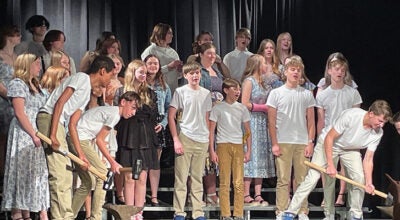Council gets clearer look at plant price tag
Published 6:57 pm Tuesday, July 19, 2022
|
Getting your Trinity Audio player ready...
|
Domestic funding includes at least a 20-year loan, monthly price hikes
The numbers on Austin’s Wastewater Treatment Plant came a little more into focus Monday night during the Austin City Council’s work session following its scheduled meeting at City Hall.
With an updated estimated cost that now reaches over $105 million dollars, City Engineer Steven Lang revealed that three construction firms have put in bids for the project.
Two of the bids came in very close to each other at just over $99 million each, while another put in a bid for over $107 million.
The council will now have to start making decisions on the bids and how to pay for the mammoth project starting with their first August meeting.
One of those decisions will revolve around paying for the domestic side of construction costs.
To pay for the $52.5 million in industrial costs, the city is entering into an agreement with Hormel Foods Corporation, which will repay the costs as costs are incurred.
However, the domestic side, which breaks down to around $52.8 million, will come from a variety of sources including grants, city sewer fund reserve money and a PFA loan to the tune of $39 million.
The council had hoped for bonding bill money, which the city was told was on the list of bonding projects from the Minnesota Legislature but was stripped at the last moment, taking $14.5 million off the table that would have been used for the plant.
Two of the areas of focus Monday night were the PFA loan as well as per month price hikes that will be needed to help cover dome of the domestic costs.
While Lang indicated that the preferred request to pay back the loan was to ask the PFA to extend the life span from 20 years to 30, the council indicated that they felt uncomfortable extending it for that amount of time.
The worry over the extension came at the knowledge that an extra $7 million in interest would be added. The consensus was to stick with the 20-year loan, which will have a direct result on sewer fee increases through 2027.
Currently, the city is in the midst of 7% incremental yearly increases, but the city will need to generate just over $8.3 million in revenue in 2027.
These will come through larger increases with a proposed 15% increase in 2023 followed by a 10% increase the following year and increases of 7% in both 2025 and 2026. The final increase would be 3% in 2027, which reflects sewer fees of $68.44 a month.
Should it be extended to 30 years, then the increases would have included four years of 7% increases.
It adds to the overall frustration of the City Council who feel the city isn’t getting support from the state, even after cities like Austin warned it that changes in regulations it was imposing several years prior could have unforeseen consequences.
That was compounded when Austin lost its bonding money this year, leaving the council hoping they will be able to secure money next year.
“This is hitting every community across the state,” City Administrator Craig Clark said.
Improving housing
Earlier in the work session, Clark brought a proposal to the council that could potentially help increase the number of single-family homes in Austin by offering a system similar to what the city offers existing residents when doing street construction.
The proposal uses street assessments by the city as a guide that would leave available lots shovel ready to build new homes.
Currently the city looks to recoup 40% of street construction costs through assessments, but generally only get 30%. The City offers residents to extend those costs over a 15-year period with 2% above insurance costs.
Clark, in a memo to the council, said that differs from new residential developments that are required to pay their own way, with developers paying 100% of costs, which are covered by a development agreement, often accompanied by a letter of credit covering estimated costs.
While Clark admitted in his proposal that some risk transfers from developer to the city, it does help with financing with a further hope to open up housing options in Austin.
“The overall goal is to help with the capital demands for the buildout of a subdivision while at the same time maintaining developers and the lot buyers account for the full costs of the infrastructure as has been the case for previous homeowners and taxpayers,” Clark’s proposal read.
Council members were open to the plan for further discussion.
“This gives us another arrow in our quiver,” Second Ward’s Jason Baskin said. “We’re going to give them the same option that we would give any citizen with work in front of their house.”
Mayo Steve King agreed, saying: “This seems like something we should look into.”
In other news
• Newly appointed First Ward council member Geoff Baker was sworn in Monday night at the start of the meeting. He was one of three candidates up for the position. He was appointed by split vote, 4-2, during a special meeting last week. His term runs through 2027.
• The council approved the Jay C. Hormel Nature Center to move forward and apply for a $300,000 grant from the Greater Minnesota Regional Parks and Trails Commission. The money, with matching funds from The Hormel Foundation, would secure two more bridges at the Nature Center.
• A public hearing has been set for Sept. 6 for the Interstate 990 Bridge Improvement Project Municipal Consent Review, which includes four bridges in Austin.





